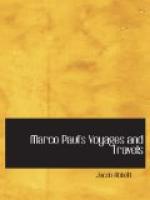“Why do they call it a lumber-box?” asked Marco.
[Illustration: THE LUMBER-BOX.]
“Why, when the country was first settled, they used to carry lumber to market principally; that is, bundles of shingles and clapboards, which they made from timber cut in the woods. It requires some time for a new farm, made in the forests, to get into a condition to produce much grass for cattle. I suppose that it was in this way that these vehicles got the name of lumber-boxes. You will see a great many of them, in the winter season, coming down from every part of the country, toward the large towns on the rivers, filled with produce.”
“What else do the farmers turn their grass into, besides wool?” asked Marco.
“Into beef,” said Forester. “They raise cows and oxen. They let them eat the grass as it grows, all summer, and in the winter they feed them with what they have cut and dried and stored in the barn for them. The farmers are all ambitious to cut as much hay as they can, and to keep a large stock of cattle. Thus they turn the grass into beef, and the beef can be easily transported. In fact, it almost transports itself.”
“How do you mean?” asked Marco.
“Why, the oxen and cows, when they are fat and ready for market, walk off in droves to Boston, to be killed. They don’t kill them where they are raised, for then they would have to haul away the beef in wagons or sleighs, but make the animals walk to market themselves, and kill them there. But the farmers don’t generally take their own cattle to market. Men go about the country, and call upon the farmers, and buy their cattle, and thus collect great droves. These men are called drovers. In traveling in this part of the country, late in the fall, you would see great droves of cattle and sheep, passing along the road, all going to Boston, or rather Brighton.”
“Where is Brighton?” asked Marco.
“It is a town very near Boston, where the great cattle market is held. The Boston dealers come out to Brighton, and buy the cattle, and have them slaughtered, and the beef packed and sent away all over the world. Thus the farmers turn the grass into beef, and in that shape it can be transported and sold.”
“And what else?” asked Marco.
“Why, they raise a great many horses in Vermont,” replied Forester. “These horses live upon grass, eating it as it grows in the pastures and on the mountains, in the summer, and being fed upon hay in the barn in the winter. These horses, when they are four or five years old, are sent away to market to be sold. They can be transported very easily. A man will ride one, and lead four or five by his side. They will be worth perhaps seventy-five dollars apiece; so that one man will easily take along with him, three or four hundred dollars’ worth of the produce of the farm, in the shape of horses; whereas the hay which had been consumed on the farm to make these horses, it would have taken forty yoke of oxen to move.”




